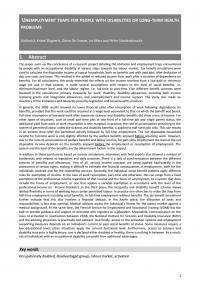Gedaan met laden. U bevindt zich op: Unemployment traps for people with disabilities or long-term health problems
Unemployment traps for people with disabilities or long-term health problems
This paper sums up the conclusions of a research project detailing the obstacles and employment traps encountered by people with an occupational disability at various steps towards the labour market. Tax benefit simulations were used to calculate the disposable income of typical households, both on benefits and with paid jobs, after deduction of
day care costs and taxes. This resulted in the added or reduced income from work after a situation of dependence on benefits. For all calculations, the study examined the effects on the income received from a low-paid or minimum wage job and in that context, it made several assumptions with respect to the level of social benefits, i.e. minimum/maximum level, and the labour regime, i.e. full-time or part-time. Five different benefit schemes were involved in the simulations: primary incapacity for work; disability; disability allowances, including both income replacing grants and integration allowances, and unemployment and income support. The study also made an inventory of the limitations and obstacles posed by legislation and social benefits practices.

Lees de publicatie
- Uitgever
- Publicatiedatum
- December 2011
- Publicatietype
- Onderzoeksrapport
- Thema's
- Gelijke kansen arbeidsmarkt
- Auteur(s)
- CSB - Universiteit Antwerpen Jan Vandenbroucke, Kristel Bogaerts, Diane De Graeve, Ive Marx, Jan Vandenbroucke
- Reeks
- WSE-onderzoeksrapporten